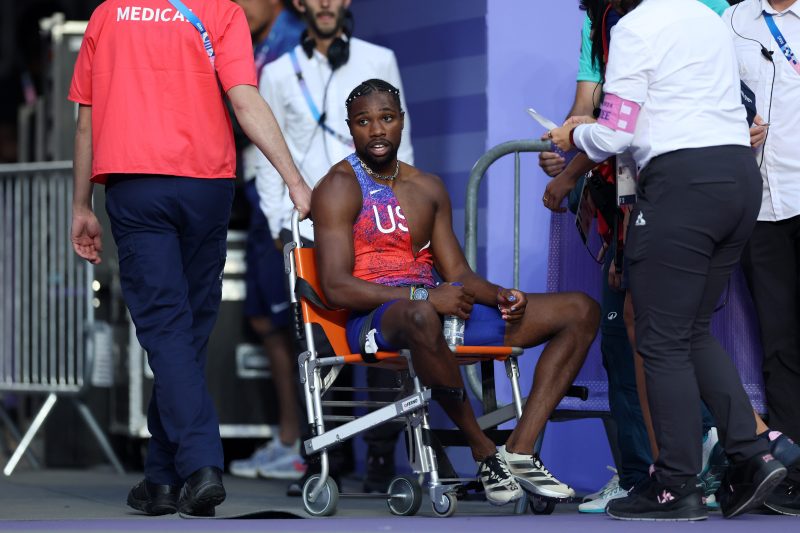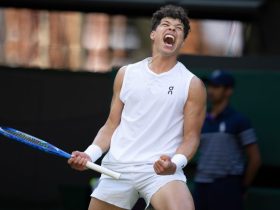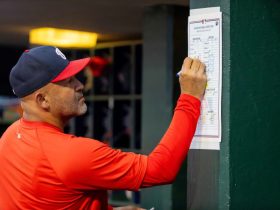SAINT-DENIS, France — Noah Lyles competed in the 200-meter final at the Paris Olympics on Thursday night while fighting COVID-19, a dramatic turn of events that cast a pall over one of the most ballyhooed races at these Games.
In a stunning scene at Stade de France, Lyles finished third in his signature event, behind Letsile Tebogo of Botswana and American teammate Kenny Bednarek, and then crumpled to the track. Medical staff quickly tended to the 27-year-old superstar, who has a history of asthma. He later left the track in a wheelchair.
Despite his illness, Lyles later confirmed the news in a televised (and masked) interview on NBC, and then even passed through the mixed zone to speak with other assembled reporters.
While still wearing a mask, he said he tested positive in the early morning hours of Tuesday but never considered withdrawing from the event in which he has won three consecutive world championships and currently holds the American record.
‘I was going to compete regardless,’ Lyles said. ‘If I didn’t make it to the finals, that would’ve been the sign not to compete.’
2024 Olympic medals: Who is leading the medal count? Follow along as we track the medals for every sport.
He said he actually felt better Thursday than he had in the two days prior, while acknowledging that the illness did impact his performance.
‘To be honest, I’m more proud of myself than anything – coming out and getting a bronze medal with COVID,’ Lyles said.
➤ Get Olympics updates in your texts! Join USA TODAY Sports’ WhatsApp Channel
In a joint statement released Thursday, the U.S. Olympic and Paralympic Committee and USA Track and Field said they ‘swiftly enacted all necessary protocols to prioritize his health, the wellbeing of our team, and the safety of fellow competitors.’
‘Our primary commitment is to ensure the safety of Team USA athletes while upholding their right to compete,’ the two governing bodies said.
‘After a thorough medical evaluation, Noah chose to compete tonight. We respect his decision and will continue to monitor his condition closely.’
In a post on Instagram, Lyles said that he believes ‘this will be the end of my 2024 Olympics.’ He was expected to run in the 4×100-meter relay.
Lyles said he first experienced the symptoms of COVID-19 in the overnight hours between Monday and Tuesday – about 24 hours after he won the 100-meter dash at the Paris Games in thrilling fashion, edging Kishane Thompson of Jamaica by just five thousandths of a second. The symptoms – aches, chills and a sore throat – reminded him of previous instances when he had contracted the disease.
‘We quickly quarantined in a hotel nearby the village, trying to get me on as much medication as we legally could to make sure that my body was able to just keep the momentum going,’ said Lyles, who confirmed when asked that he is taking Paxlovid.
‘I still wanted to run, they said it was still possible. We just stayed away from everybody and tried to take it round by round.’
Lyles cruised through his qualifying heat Tuesday morning, then finished second in his semifinal Wednesday. He said he did not inform his fellow competitors or teammates that he had come down with COVID-19 − in part to avoid inciting panic and in part because he didn’t want to inform them that he wasn’t operating at 100%.
‘Why would you give them an edge over you?’ he said.
It wasn’t until after Thursday’s final that Lyles let the news out, offering an explanation for the chaotic scene that unfolded on NBC’s broadcast – a sprinter sprawled out on the track, as medical aides approached him with oxygen and a wheelchair.
‘I was quite light-headed after that race, (with) shortness of breath and chest pains,’ Lyles said. ‘I was able to catch my breath and get my wits about me. I feel a lot better now.’
The Paris Olympics have been touted as the first Games to be held after the COVID-19 pandemic, but news of Lyles’ positive test served as the clearest reminder yet that the world is not yet completely rid of the disease.
Lyles becomes the most prominent athlete to contract COVID-19 at the Paris Games, joining a list of others that includes British swimmer Adam Peaty. The World Health Organization said Wednesday that, based on its monitoring of media reports and other public sources, about 40 athletes at the Paris Games had tested positive as of Wednesday.
When asked about COVID-19 cases at the Games, an International Olympic Committee spokesperson has repeatedly said the IOC is not tracking such figures and referred all questions to France’s national health authorities or local organizers. Spokespeople for the IOC and Paris 2024 did not immediately reply to messages late Thursday.
Jonathan Finnoff, who is the USOPC’s chief medical officer, had previously said that U.S. athletes who tested positive for COVID-19 or another respiratory illness would be moved into their own rooms to prevent the spread of the disease. But they would not be prohibited from training or competing.
‘We’ll do that based on their symptoms and how they feel, but we do want to prevent (them) from infecting those around them, and we’ll also provide prophylaxis based on what is recommended by CDC guidelines,’ Finnoff said.
For Lyles, the outcome was a metaphorical door left ajar, enabling him to win his second bronze medal in as many Games. It’s not the gold he had originally sought, nor the 100-200 sprint double that no man has achieved since Usain Bolt. But, given the circumstances, bronze was all right.
‘Yeah,’ Lyles said. ‘It’s been a wild Olympics.’
Follow the reporters on social media @Tom_Schad, @TheTylerDragon and @nrarmour.






